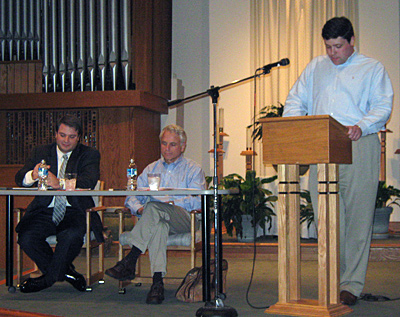
 TAYLORS—Members of Prince of Peace Church turned out last week to hear fellow Catholics share their impressions of Pope Benedict XVI’s encyclical “Caritas in Veritate.”
TAYLORS—Members of Prince of Peace Church turned out last week to hear fellow Catholics share their impressions of Pope Benedict XVI’s encyclical “Caritas in Veritate.”
Ty Tessitore, Ph.D., professor of political science at Furman University, and Gus Suarez, an attorney specializing in employment and immigration law with Ogletree Deakins in Greenville, explored the 144-page encyclical and what its message means to Catholics and society as a whole.
They were invited to speak by Joe Waters, director of adult education and parish mission at the church.
The Vatican released “Caritas in Veritate” last summer to commemorate the 40th anniversary of Pope John VI’s landmark encyclical “Populorium Progresio” on the development of people.
In prefacing his comments, Tessitore said Caritas in Veritate presents a challenge for its readers. “I recommend reading it, but it’s very challenging and thoughtful,” he said.
The encyclical is framed around the current move toward a more global society and what the Catholic Church can and can’t offer to the discussion of globalization.
Tessitore, who limited his remarks primarily to the first two chapters of the six-chapter encyclical, said Pope Benedict builds on “Populorium Progresio.”
“A lot has happened in the world since Pope Paul VI’s encyclical,” Tessitore said, “and Pope Benedict’s encyclical says the principal development is the explosion and ferocious pace of interdependence among nations.”
In his writing, Pope Benedict points out that the “defacto interdependence of nations is not matched by an ethical interaction that could give rise to truly human development.”
What Pope Benedict is saying, according to Tessitore, is that while technology, along with the utilitarian need for interaction among nations, has accelerated globalization, “to get true human development, we need something more,” which is “charity illumined by the light of reason.”
Pope Benedict writes that while the church can’t offer technical solutions to world issues, it does have “a mission of truth to accomplish with respect to human dignity.”
“Here the church can contribute something that the social sciences can’t,” Tessitore said.
He said that while Pope Benedict’s encyclical notes that the world’s economic and technological development are positive goods, as are human knowledge and science, the truth revealed in Scripture is also needed.
Through Scripture, the church can broaden society’s concept of reason, Tessitore said.
For Suarez, Pope Benedict is saying that true human development can’t be accomplished without charity working hand-in-hand with truth.
“We’re called to be like God; we’re called to charity and truth,” Suarez said. He said the heart of the encyclical’s message is the need to see humanity in everything we do. Removing the human element from any issue makes that issue problematic.
Drawing on his experience in the legal system, Suarez said the encyclical calls on Catholics to go beyond simple justice or the righting of a wrong.
“Charity demands justice,” Suarez said, “but it doesn’t stop there. The Old Testament is about the law. The New Testament is about going above and beyond the law—about taking it to the next level.” He said society tends to focus too much on simple justice at the expense of what Pope Benedict calls “the common good.”
For example, on immigration, Suarez said the encyclical urges leaders of nations to talk about solutions that respect the human dignity of people.
He said “Caritas in Veritate” is a compass. “It shows us how to orient our lives. If we guide ourselves with these principles of charity in truth, then we can address the issues.”
